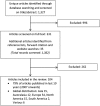Hospital outcomes of older people with cognitive impairment: An integrative review
- PMID: 29947150
- PMCID: PMC6099229
- DOI: 10.1002/gps.4919
Hospital outcomes of older people with cognitive impairment: An integrative review
Abstract
Objectives: To summarise existing knowledge of outcomes of older hospital patients with cognitive impairment, including the type and frequency of outcomes reported, and the additional risk experienced by this patient group.
Methods: Integrative literature review. Health care literature databases, reports, and policy documents on key websites were systematically searched. Papers describing the outcomes of older people with cognitive impairment during hospitalisation and at discharge were analysed and summarised using integrative methods.
Results: One hundred four articles were included. A range of outcomes were identified, including those occurring during hospitalisation and at discharge. Older people with a dementia diagnosis were at higher risk from death in hospital, nursing home admission, long lengths of stay, as well as intermediate outcomes such as delirium, falls, dehydration, reduction in nutritional status, decline in physical and cognitive function, and new infections in hospital. Fewer studies examined the relationship of all-cause cognitive impairment with outcomes. Patient and carer experiences of hospital admission were often poor. Few studies collected data relating to hospital environment, eg, ward type or staffing levels, and acuity of illness was rarely described.
Conclusions: Older people with cognitive impairment have a higher risk of a variety of negative outcomes in hospital. Prevalent intermediate outcomes suggest that changes in care processes are required to ensure maintenance of fundamental care provision and greater attention to patient safety in this vulnerable group. More research is required to understand the most appropriate ways of doing this and how changes in these care processes are best implemented to improve hospital outcomes.
Keywords: cognitive dysfunction; dementia; integrative review; older people; outcomes; patient admission.
© 2018 The Authors. International Journal of Geriatric Psychiatry published by John Wiley & Sons Ltd.
References
-
- Mukadam N, Sampson EL. A systematic review of the prevalence, associations and outcomes of dementia in older general hospital inpatients. Int Psychogeriatr. 2011;23(3):344‐355. - PubMed
-
- Siddiqi N, House AO, Holmes JD. Occurrence and outcome of delirium in medical in‐patients: A systematic literature review. Age Ageing. 2006;35(4):350‐364. - PubMed
-
- Alzheimer's UK , Fix Dementia Care: Hospitals. 2016.
-
- Briggs R, Dyer A, Nabeel S, et al. Dementia in the acute hospital: The prevalence and clinical outcomes of acutely unwell patients with dementia. QJM. 2017;110(1):33‐37. - PubMed
-
- Sampson EL, Blanchard MR, Jones L, Tookman A, King M. Dementia in the acute hospital: Prospective cohort study of prevalence and mortality. Br J Psychiatry. 2009;195(1):61‐66. - PubMed
Publication types
LinkOut - more resources
Full Text Sources
Other Literature Sources


